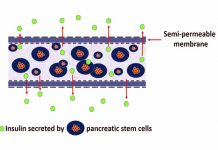
In a latest study, researchers demonstrated that it is possible to improve glucose homeostasis and insulin sensitivity by electrically regulating the carotid sinus nerve (CSN). It is a sensitive nerve that establishes a connection between the brain and the carotid body. It works as a sensor and responds to oxygen partial pressure in body and transfers stimulation to carotid sinus nerve so that the brain can respond to it. Also, carotid body is linked with the insulin sensitivity. Hypercaloric diets can lead to over-activation of carotid body cells and causes hypertension and insulin resistance which can lead to type-2 diabetes.
The research was conducted by a team of researchers lead by Sílvia Vilares Conde, CEDOC-NOVA Medical School. Galvani Bioelectronics, a pharmaceutical company, collaborated with the research team. The research was conducted on diabetic rats and it was found that the levels of insulin in body, affected by diabetes can be restored by bilateral resection (surgery) of the CSN. This disconnects carotid body with the brain and thus can be helpful in restoring insulin sensitivity. However, CSN plays other major roles too such as determining the reduced oxygen partial pressure (in case of hypoxia) and transferring stimulation to brain.
However, with the partnership of Galvani Biometrics, it became possible to check the response of carotid sinus nerve to the electric modulation. It was found that electric modulation can be effective in restoring glucose homeostasis and manage insulin resistance of the body. Silvia Conde says, “this work opens the door to the development of a new therapeutic for type 2 diabetes that will provide a long-term management of the disease with negligible adverse effects and interference with daily activities”.










